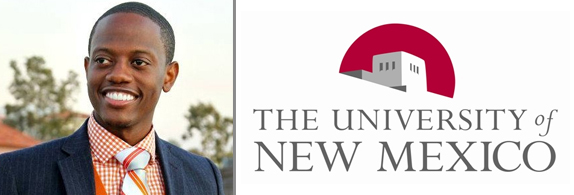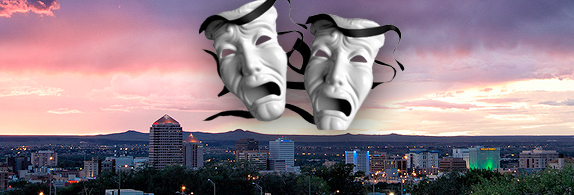Lemeck “Humble” Lukanga

Every once in a while something wonderfully simple and true comes along to bring clarity to many complications. Such a moment occurred during the University of New Mexico’s undergraduate commencement address this May given by Lameck “Humble” Lukanga, a Ugandan émigré who holds both a BA and an MA in business from UNM.
A man who radiates vast good will with just his smile, Humble Lukanga told the packed commencement audience a powerful truth that, if we search within ourselves, we know is the map for a life of generosity and fulfillment.
He said matter-of-factly, with the warmth of certainty learned from a life of contrasts, some terrifying some miraculous, that “a successful life is a happy life. Success is not a destination; it is a choice. Everything else is just marketing. The key to happiness is gratitude.”
His message had a unique power as it came from a man whose childhood had been spent in the middle of a civil war in Uganda. He survived those horrors. And the audience of graduates could tell that he walked his talk.
When you’re grateful you’re attentive. You have what someone called a “wide awakeness” about you. You come to see what people who live happily despite physical pain or other torments seem to understand. They focus on the parts of their bodies and their lives that don’t hurt and are working well. They are more grateful for them than they are distressed by their sufferings, which they refuse to allow to dominate them and their approach to living.
Living through a civil war Humble Lukanga must have seen humanity at its most degraded. He also saw, I’m sure, acts of compassion and courage that inspired him. Living in terrible conditions with little food and water, and violence all around, he managed to survive by his own clarity of mind and the good will of others. At age 11 he was granted asylum in the United States.
Many people know something of the hardship of enduring terrible conditions, even those powered by hate and revenge, not to mention brutal poverty and the ill health it can bring. They know that luck and kindness often rescue us. And they know people who’ve come through situations much worse than theirs with a grateful and joyous sense of life. Gratitude, I’m sure, helped them to remain free enough to be aware of the possibilities of hope and energized enough to act on those possibilities when they could.
Humble Lukanga’s formula -- that happiness is success and gratitude the key to happiness -- is tied together by choice. That’s why it’s such a useful idea to me. The less free you are the less choice you seem to have. And the less choice you seem to have, the unhappier you become. But when gratitude intervenes you see instinctively that there are really two kinds of freedom, one dependent on external circumstances, the other dependent on your attitude and approach to life.
Oxford philosopher Isaiah Berlin labeled these two kinds of freedom as “negative liberty” and “positive liberty.”
“Negative liberty” can be described as “freedom from” – freedom from interference, oppression, inhibiting situations and cultural pressures. “Positive liberty” could be described as “freedom to” -- freedom to see possibilities, to make choices and to carry them out. It’s the freedom of self-determination as far as one can take it.
The conditions Humble suffered in Uganda as a child put him in a position where he was not free from danger and deprivation. The war drastically curtailed his freedom and limited his freedom to make certain kinds of choices. But his core sense of gratitude and the powerful energy of optimism it brought to him, along with the heightened sense of awareness that empowered him to find ways endure, allowed him to participate in the miracle of his own survival against horrendous odds.
What happened, in Berlin’s terms, is that Humble developed the skills and stamina, the active gratitude to maximize positive liberty, the freedom to find ways to endure and overcome oppressive external situations from which he could not readily escape. What a powerful message for young college graduates who are about to learn the struggles of the world first hand. Many young people in New Mexico, of course, are already well schooled in poverty and violence, but have chosen, like Humble did, to not only survive them but to prevail against them. Their diplomas prove it.
That’s why Humble’s admonition at commencement is so useful. It implies that even if you are a young person in a bad situation, choosing gratitude will help you see the good things in your life and empower you to make the most of them. Gratitude makes it possible to choose the mysterious power of optimism and the choices it reveals. Then you have a chance to strengthen your understanding of positive liberty, the “freedom to” try to be who you want to be and lead a fruitful life – and perhaps not confuse acquiring riches with happiness and success.
“A successful life is a happy life. Success is not a destination; it is a choice; everything else is just marketing. The key to happiness is gratitude.”
The aim of Lemeck “Humble” Lukanga’s commencement address was to ease the path of others by choosing to be generous with his life story and the lessons he has learned from it. This generosity is, in itself, an active form of gratitude. He eases the path of others by walking the talk of his life, and showing young people that what he says can be as true for them as it is for him. And what gift that is!
By the way, he got a standing ovation from his audience.
No More Years

Many folks are disappointed over the outcome of the Democratic primary results for governor. But New Mexico simply cannot afford another four more years of the Martinez Administration that sucks the energy and optimism out of our state like a cosmic black hole sucks the light out of stars.
It doesn’t matter who won the primary. She’s got to go. We all know it. Nothing else matters.
Democrats have a 60% voter registration advantage here. That means that that there are almost 200,000 more registered Democrats than there are Republicans.
If Democrats can’t elect Gary King governor the Party should hang its head in shame, disband itself, and morph into a local version of an Italian Parliament with a dozen or so splinter parties and concede everything to the Koch Brothers.
The governor is a sitting duck. We’ll all be talking about this a lot over the months until November. But here are some of the basics.
When compared to her performance, her priorities are meaningless.
The first priority on her official website is “educating our children.” She can’t even get her Education Secretary confirmed after four years. Nine out of ten teachers in our state think she’s trying to wreck the education system and our kids are still woefully neglected by educational ideologies that won’t work and by private education companies that prey on taxpayer dollars.
Her second priority is “balancing the budget.” The governor is making a “priority” out of a constitutional mandate. The constitution requires, with no option, the governor and the legislature to run a balanced budget every year. There’s no way out of that. They can’t do otherwise. For her to take credit for that is like a shark taking credit for having teeth.
Her third priority is “ensuring transparency and ethics in government.” Here operatives and editorial champions claim she is the “most transparent governor in history.” Does that mean you can see right through her? Taking credit for running an open government is like taking credit for telling the truth. That’s what you’re supposed to do! But I guess if you’ve got nothing else, you’ll take credit for walking on two legs, if that helps the cause. The problem is, though, that the governor is like the Wizard of Oz, running the state behind a curtain of secrecy and PR hype.
The Santa Fe Reporter thought so much of the governor’s transparency they filed a lawsuit against her claiming she “has seven times violated the state Inspection of Public Records Act and has circumvented the state Constitution’s ‘free press’ provision by engaging in a campaign of retaliation. … Martinez refused to respond to inquiries …from the Santa Fe Reporter because she didn’t like the tone of the newspaper’s coverage, an unlawful act called ‘view point discrimination’ or ‘prior restraint’.”
Her fourth priority is “keeping New Mexicans safe.” Given the gun violence on the part of the New Mexico State Police lately and the 26 killings by city police in Albuquerque with its Martinez backed police chief and its Martinez sidekick mayor I’d say “keeping New Mexico safe” has sunk under the horizon since she took office.
From my perspective, Gary King’s winning gubernatorial platform would be composed of the following issues:
- As he said on election night, it is unacceptable to him and to the people of New Mexico to have the wellbeing of our children in last place in the nation, behind even Mississippi. The fix is a complex web of humane economic conditions, including decent wages, health care, and social services, all the things that the Martinez administration has squelched in favor of a bogus austerity that lines the pockets of the rich at the expanse of the have-nots.
- A massive jobs development initiative to overcome New Mexico’s status as having one of the worst records of job recovery after the Republican recession of 2008, devoted largely to incentivizing and stimulating local businesses as opposed to giving away New Mexico’s livelihood to out-of-state companies with no local connection and no local loyalty.
- Addressing one of the most grievous public safety issues in New Mexico history uncovered by the U.S. Department of Justice investigating the unconstitutional use of lethal and nonlethal force in the Albuquerque police department, and using his authority and experience as a former Attorney General to completely overhaul the New Mexico Law Enforcement Academy and its curriculum so it can influence substantive change in police culture across New Mexico.
- Get tough on the KAFB jet fuel spill, on the Sandia Laboratory mixed waste landfill, on WIPP regulation and oversight, on oil and gas drilling and wastewater pits rules, on mining and wastewater by overturning the so-called copper rule, putting an end to all thought of damming and diverting the Gila River, and opposing the BLM on permitting oil and gas fracking and drilling around Chaco Canyon and Otero Mesa, with its pristine grasslands and vast resources of pure fossil water.
- Create a detailed, evolving state water plan with input from all sixteen regional water planning entities and all other stakeholders, a water plan that is based on climate change science and state of the art drought projections and that is localized to meet the variety of climates and cultures of New Mexico.
- Give incentives and priority to New Mexico’s renewable energy industries both to ramp up clean energy production and to give New Mexico a national presence as a forward-thinking and technologically sophisticated state.
- Other platform issues include gender wage equality, the preservation of public employee pensions, a supportive relationship with teachers’ unions and capital needs at the state’s colleges and universities including their professors and part-timers.
The point is that Governor Martinez has little more than a PR reputation because she has done practically nothing with the opportunities of her office. She is a sitting duck for a Democratic party that can find the gumption, organization and money to go for the jugular to protect New Mexico and its people from four more years of aggressive and damaging inertia.
Abjection

How is it possible to understand the climate of violence that has poisoned the peace of mind of our city? Many of us, myself included, are struggling with a tangle of sorrow, fear, anger, and disbelief. How could it be that our city has become what it is? Of course we have no right to expect that we’d be any different from the rest of the world. But to have things go so wrong and in such a brutal way, how do we make sense of any of it?
The people of Albuquerque, like people everywhere, are sensitized to violence that we experience, most of it vicariously: More than seventy incidents of people with guns shooting up schools and killing children around the country. Two sheriff’s deputies shot dead in Las Vegas, NV while they were having lunch by a couple of white supremacist anti-government “revolutionaries” who killed an innocent shopper in Walmart as well. Hundreds, if not thousands, of people being allowed to die in the desert trying to get into this country from Latin America.
And now here, twenty six police killings mostly of non-violent, troubled people in Albuquerque since 2010. And so many police beatings and Taserings it’s impossible to keep track of them. Appalling reports about the torments and sufferings of inmates at the Bernalillo County Detention Center, out of sight out of mind on the West Mesa. All the brushes with crime and cruelty and violence that most of us have experienced over our lifetimes that seem to be accelerating now – the multiple burglaries at my house, for instance, none of them solved; the crippled old friend of mine beaten up on Central near UNM one afternoon by thugs who were never caught; the violent misogyny of mass murderers and serial killers who’ve dumped dead bodies on the West Mesa; a woman driving on Paseo del Norte in broad daylight who is shot in the face through her windshield; a friend who missed by inches getting shot in his truck driving on Montgomery by a gangster-wanna-be going through an initiation.
And if that wasn’t enough, now people who have had their children, spouses, or siblings killed by police shooters are being called “protesters” and disparaged in the mainstream media as if they were unruly brats, not people in deep mourning, abject grief, and boiling outrage at having been ignored, shut out, and stonewalled, sometimes for years, trying to get a modicum of justice for the loss of those they love. And many Albuquerque residents no longer feel they can trust the police to come to their aid if they’re in trouble with real criminals, for fear being made suspects themselves.
It’s almost impossible to fathom. But there is a human condition that describes these bewildered feelings. It’s called Abjection, taken from the word “abject” used as an adjective to describe utterly terrible conditions, like abject poverty.
Philosopher Julia Kristeva in her book Powers of Horror uses “abjection” to describe conditions in which people are abjectly excluded and marginalized, ignored and denied equality with those in power who are the inheritors and guardians of the status quo. The term also has to do with the kinds of abject violence that “draws attention to the ‘fragility of the law’.”
Abjection causes a sense of depression, meaninglessness, the feeling of living a life without hope. It’s a condition that much of the world has experienced periodically, from people who are bound to a culture of poverty to marginalized women who are told they are equal when they know they are not, from the mentally ill and people with physical disabilities to people who are vulnerable to social abuse and neglect because they are deemed not really important enough to pay attention to.
The growing community of many thousands of Albuquerque residents who are seeking an end to unconstitutional police violence in their city have been consigned to a condition of abjection by the Berry Administration. Many have been living with it for years. All are fed up with it. They don’t want to be shooed away like pesky insects anymore. They want to be heard, and they want their abject condition to be lifted by serious, compassionate, and humanitarian concern for not only their losses, but for the future of their city in which police behavior has been elevated to a high standard of empathy and service.
They know that in a world like ours today that such a transformation will take a combination of time and miracles to achieve, but they are willing to work for such a goal to relieve their own sense of abjection and that which more and more people in our city are experiencing as fear of crime and fear of unlawful authority absorbs more and more of their energies.
The peaceful, but insistent, anti-police violence campaign of 2014 in Albuquerque is an immensely important social movement, one that breaks the mold of normalized apathy, and one that could serve as a model for even environmental, water, and anti-pollution struggles of the future.
Honor this movement. Do not disparage it. These are brave people who have had enough.
(Photos: Report card by amboo who?, Albuquerque skyline by Todd Shoemake)




Responses to “Provincial Matters, 6-16-2014”